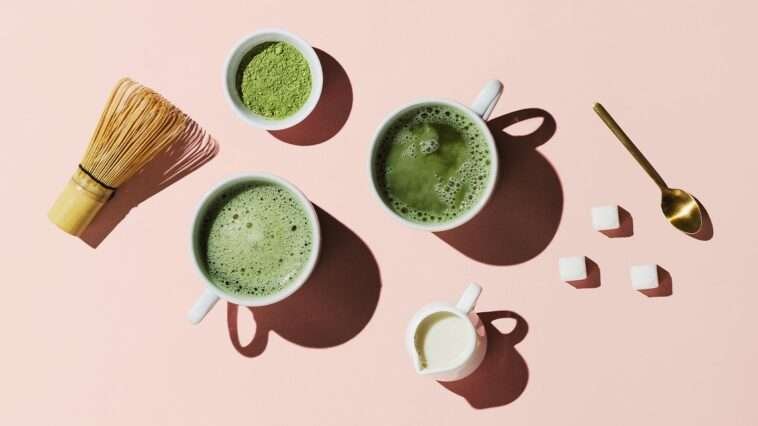Although it doesn’t precisely come from trees, coffee does come from the coffea plant, a flowering shrub. The roasted seeds from the plant’s fruit are what you use to make the delicious coffee that you grind up and brew.
Green tea from the Camellia sinensis tea plant is used to make Matcha. Matcha is created by finely powdering the leaves, unlike normal green tea.
Matcha has a strong flavour on its own, but it lacks the bitterness of coffee and instead has a more earthy, botanical flavour. Similar to coffee, most people find that matcha takes some getting used to, especially without the addition of any sugar or cream.
If you are wondering which drink, coffee or matcha, is better for weight loss, we have got you covered,
Coffee or Matcha:
Even while there hasn’t been much research done especially on matcha, several studies have revealed a connection between green tea leaves and weight loss.
Numerous studies have discovered beneficial effects of green tea extract on fat metabolism, both during exercise and at rest, according to a 2013 review. This may be because green tea contains the antioxidant epigallocatechin gallate (EGCG), which is to blame. But all of these results come from research on animals. For the results to be confirmed, more human studies are required.
Researchers hypothesise that EGCG may also lessen inflammation and facilitate weight loss.
The research is still not conclusive. According to a 2014 analysis, persons who were overweight or obese who frequently consumed green tea preparations for 12 weeks did not significantly lose weight compared to the control group.
Why Switch to Matcha?
Abundant in Antioxidants:
Antioxidants abound in matcha, just like they do in its cousin green tea. These antioxidants, called polyphenols, are extremely potent. Matcha powder also retains even more of the beneficial ingredients thanks to the method of production, which involves grinding up the whole leaf. In fact, one of the foods with the highest antioxidant content is matcha.
Antioxidants have a variety of advantages. They can aid in the prevention of some types of cancer as well as the treatment of certain illnesses and infections. Coffee doesn’t have any antioxidants and a cup of matcha has around ten times as many as a cup of green tea.
Regulates Energy Levels:
Did you ever have jitters after consuming coffee? Or did you feel like you crashed a few hours later? That is due to the manner in which coffee delivers its caffeine. It takes place instantly and swiftly. As a result, you can feel jittery and hungry. Additionally, coffee may influence your levels of glucose and insulin.
However, matcha provides a much “cleaner” caffeine high. Because the caffeine is released gradually, you get a longer, smoother energy boost. The amino acid L-Theanine, which slows down the body’s absorption of caffeine, is to blame for this.
Despite having less caffeine than a cup of coffee, matcha may help you stay alert for up to three hours longer. And none of this comes with a chance of being jittery. For those who wish to enjoy an energy boost but are particularly sensitive to caffeine, matcha may be a viable substitute.
Matcha Calms Nerves:
You can feel calmer thanks to the same amino acid that decreases caffeine absorption. It has been demonstrated that the L-Theanine in matcha promotes sleep. It also promotes calmness when paired with matcha’s gradual caffeine release.
On the other side, some people may discover that coffee makes their anxiety symptoms worse. You may feel more anxious if you consume more than one cup each day. Additionally, you might show bodily symptoms of anxiousness as shaking or palpitations.
Matcha is used by Buddhist monks as a meditation aid because it gives the brain a feeling of clarity, calmness, and alertness.
Non Addictive:
You may have experienced some negative affects if you’ve ever tried to kick your coffee habit. Some of the symptoms of coffee withdrawal include headaches, lethargy, nausea, and muscle discomfort.
The energy increase from coffee leads to withdrawal symptoms. Your body desires more coffee to duplicate the spike it just experienced since it comes so quickly. You can really tell the difference when you don’t.
Fortunately, matcha won’t cause you to experience the same issue. If you go a few days without a cup, you’ll still feel fine because your body won’t become as dependent on it.
Matcha for Weight loss:
By attacking weight reduction from two angles, matcha has been demonstrated to improve metabolism and burn fat. This will give you more energy and put your body into a healthy fat-burning state without increasing your blood pressure or cortisol levels. When ingested before workouts, matcha is especially effective at accelerating fat loss, according to studies.
Read More: Matcha vs Coffee : Which One is Healthier?
Which Should You Choose:
Making the perfect cup of matcha is simpler than making the perfect cup of coffee. No expensive espresso maker or grinder is needed to prepare matcha. To create this, simply combine the powder with hot water.
Packed with antioxidants that improves overall health, aids weightloss and is also a savior in the world of skincare, Matcha is what the world needs. Make the right switch at the right time and thank us later.





